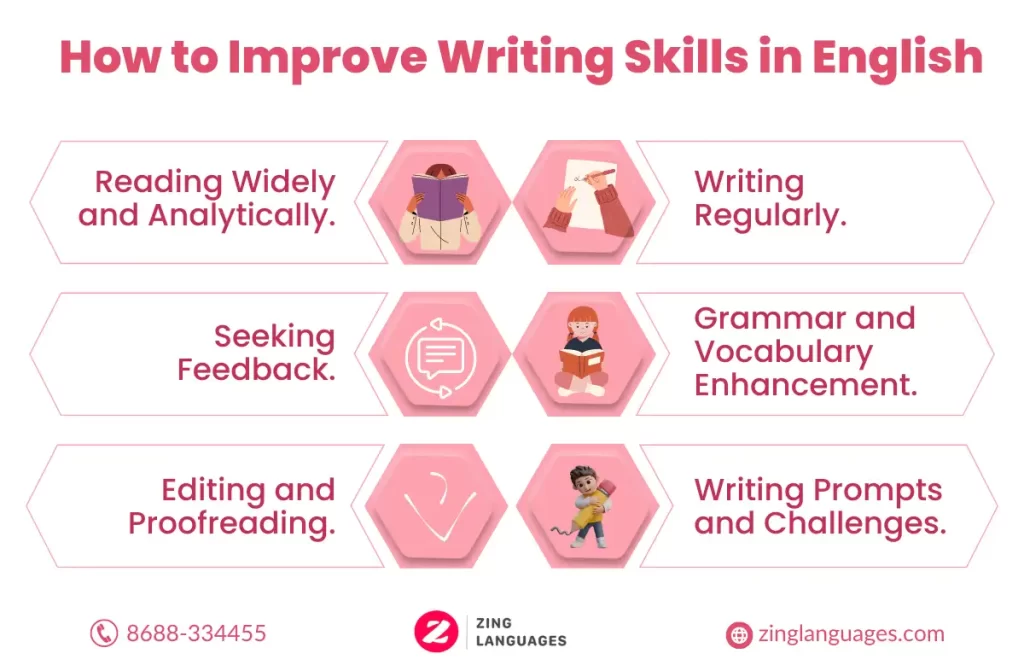How to improve English writing can open doors to a myriad of opportunities. This article delves into comprehensive strategies that can help you elevate your writing prowess and confidently express yourself in written form.
How to improve writing skills in English
Effective communication is a cornerstone of success in today’s globalized world, and strong writing skills play a pivotal role in conveying ideas, opinions, and information. Whether you’re a student, a professional, or simply someone looking to enhance your language proficiency in foreign languages.
Understand the Writing Process
Before embarking on any writing endeavor, it’s essential to grasp how to improve English writing the writing process. This involves prewriting (brainstorming and planning), drafting, revising, editing, and proofreading. Each stage contributes to crafting coherent, organized, and polished pieces of writing. Embrace this structured approach to enhance the clarity and effectiveness of your content.
Read Widely and Regularly
Reading is a powerful tool for improving how to improve English writing. Exposure to diverse genres, styles, and authors exposes you to various writing techniques and vocabulary. Analyze How to improve writing skills in English and how Online English Proficiency Tests different writers present ideas, develop arguments, and maintain a cohesive flow. The more you read, the more you absorb and integrate elements of strong writing into your own work.

Expand Your Vocabulary
A rich vocabulary allows you to articulate ideas with precision and nuance. Utilize a thesaurus to discover synonyms and antonyms that can add depth to your writing. However, ensure that the vocabulary you incorporate aligns with the context and tone of your piece.
Practice Writing Regularly
Just like any skill, writing improves with consistent practice. Set aside dedicated time to write Why English is Important for Career Advancement. Experiment with different genres such as essays, stories, articles, and emails. This practice not only hones your writing skills but also nurtures your creativity and enhances your ability to adapt your style as needed.
Focus on Grammar and Punctuation
Clear and accurate writing hinges on solid grammar and punctuation. Review grammar rules and commonly confused words. Pay attention to sentence structure, subject-verb agreement, and the appropriate use of punctuation marks. Grammatical errors can disrupt the flow of your writing and obscure your intended message.
Seek Constructive Feedback
Feedback is an invaluable resource for growth. Share your writing with peers, mentors, or online writing communities. Constructive criticism helps you identify areas for improvement that you might not have noticed. Additionally, analyzing others’ writing with a critical eye enhances your ability to identify effective writing techniques.
Revise and Edit Thoroughly
The first draft is rarely the final draft. Allocate ample time for revising and editing. Focus on refining your content’s structure, clarity, coherence, and logical progression. Eliminate redundant or irrelevant information and ensure a smooth transition between paragraphs and ideas.
Develop a Distinctive Style
Your writing style is an extension of your personality. While maintaining clarity and coherence, infuse your writing with your unique voice. A distinctive style engages readers and makes your content memorable. Experiment with tone, sentence length, and figurative language to develop your own writing identity.
Embrace Constructive Criticism
Receiving criticism, whether from peers, mentors, or editors, is a crucial aspect of growth. Approach feedback with an open mind and a willingness to improve. Constructive criticism helps you identify blind spots, refine your skills, and elevate the quality of your writing.
Proofread Rigorously
Errors can undermine the credibility of your writing. Proofreading is your final line of defense against typos, grammatical mistakes, and punctuation errors. Take a break between writing and proofreading to view your work with fresh eyes. Reading your piece aloud can also help you catch mistakes that might otherwise go unnoticed.
How to Improve Your English Grammar: A Comprehensive Guide
Grammar is a fundamental aspect of effective communication in English. Whether you are a student aiming to excel in academic writing or a professional seeking to enhance your workplace communication, having a strong grasp of Why English is Important for Career Advancement is indispensable. In this comprehensive guide, we will provide you with valuable insights and strategies to help you know how to improve English Grammar skills.
Understanding the Building Blocks of Language
The foundation of good grammar lies in understanding the various parts of speech. These parts of speech are like the building blocks of language, and by comprehending their roles, you can significantly know how to learn English basic grammar to enhance your writing and communication skills.
Nouns
Nouns are the bedrock of language, representing people, places, objects, or ideas. Examples include “Michel Jackson,” “Kuwait,” “school philosophy,” “happiness,” and “dog.”
Adjectives
Adjectives modify nouns, providing additional information about their attributes. Examples of adjectives are “green,” “talented,” “lazy,” “tall,” and “short.”
Pronouns
Pronouns replace nouns to avoid repetition. They include personal subject pronouns (e.g., “I,” “she,” “they”), personal object pronouns (e.g., “you,” “it,” “us,” “them”), personal possessive pronouns (e.g., “mine,” “his,” “hers,” “yours,” “theirs”), and relative pronouns (e.g., “who,” “which,” “that,” “whose”).
Verbs
Verbs express actions or states of being, defining what the subject (noun) is doing. Examples of verbs include “read,” “write,” “be,” “seem,” and “have.”
Adverbs
Adverbs modify verbs, adjectives, and other adverbs, providing more information about actions. Examples are “slowly,” “silently,” and “loudly.”
Prepositions
Prepositions establish relationships between two objects in a sentence, indicating location or direction. Common prepositions include “in,” “on,” “over,” “under,” “below,” “above,” “behind,” and “in front of.”
Conjunctions
Conjunctions join words, phrases, or clauses together. Examples are “and,” “or,” “but,” “nor,” “yet,” and “so.”
Interjections
Interjections express emotions or exclamations and are often used independently. Examples include “aww,” “ouch,” and “phew.”
The Power of Diverse Reading
Reading is a cornerstone of grammar improvement. By exposing yourself to a variety of written materials, you can gain insights on how to improve English Grammar skills. Here are some tips to guide your reading journey.
Read a Variety of Materials
Expand your reading repertoire to include classic literature, textbooks, science fiction, biographies, blogs, essays, and articles. Diversifying your reading material will expose you to different writing styles and grammatical structures.
Pay Attention to Grammar
While reading, observe how authors structure sentences, select words, and employ punctuation. Identifying these elements will deepen your understanding on how to improve English Grammar skills.
Read Aloud
Reading aloud allows you to internalize language rhythms and nuances. It helps you connect written words to spoken language and can be an enjoyable practice.
Keep a Dictionary and Thesaurus Handy
Encounter unfamiliar words? Reach for a dictionary or thesaurus to expand your vocabulary and find suitable synonyms.
Stay Informed
In addition to books, stay updated on current events by reading newspapers, listening to news radio, and watching news programs. This exposes you to language usage in various contexts.
Listening as a Learning Tool – How to Improve English Grammar
Listening to native speakers is an invaluable method for improving your grasp of how to improve English Grammar skills. Here’s how you can harness the power of listening and Online English Proficiency Tests.

Imitate Native Speakers
Pay close attention to how native speakers construct sentences, use common phrases, and employ vocabulary. Replicating their sentence structures can enhance your spoken and written English.
Practice Repetition
Learn sentence construction by repeating what you hear. This helps reinforce vocabulary and sentence patterns.
Ask Questions
Don’t hesitate to seek clarification if you encounter language nuances or unfamiliar expressions. Asking questions regarding how to learn English basic grammar can foster learning and better understanding.
The Writing Practice Advantage
Writing is an essential skill to help you know how to learn English basic grammar effectively. Here are ways to incorporate daily writing into your routine.
Keep a Journal
Maintaining a daily journal provides a platform to spot grammar mistakes and integrate new rules and vocabulary into your writing.
Write Short Stories
Crafting short stories allows you to focus on areas where you make recurring mistakes and can be an enjoyable creative exercise.
Common Punctuation Errors to Avoid
Proper punctuation is crucial for conveying meaning accurately. Avoid these common punctuation errors while considering how to improve English grammar:
Run-on Sentences
Separate independent clauses with either a semicolon or a period to avoid run-on sentences.
Comma Splices
Use a comma followed by a coordinating conjunction like “and” or “but” to join independent clauses properly.
Apostrophes
Apostrophes indicate contractions or possession, not plurals.
Quotation Marks
Reserve quotation marks for direct quotations and avoid improper usage.
Conclusion
In your journey on how to improve English Grammar skills, remember that practice and exposure to diverse language sources are key. Additionally, be vigilant about common punctuation errors to enhance your communication skills. To accelerate your grammar improvement, consider utilizing online platforms like Zing Languages as it offers personalized grammar lessons and exercises, with experienced tutors providing feedback to help you refine your writing and speaking skills.
Check out Foreign Language to Learn in India.

